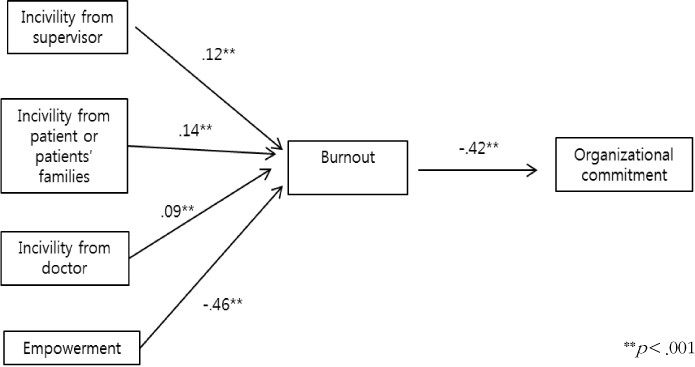J Korean Acad Nurs Adm.
2013 Dec;19(5):555-564.
Path Analysis for Workplace Incivility, Empowerment, Burnout, and Organizational Commitment of Hospital Nurses
- Affiliations
-
- 1Department of Nursing, Mokpo University, Korea.
- 2Department of Nursing, Dankook University, Korea. jongkimk@dankook.ac.kr
- 3Department of Nursing, Sunchon National University, College of Life Science and Natural Resources, Korea.
Abstract
- PURPOSE
The purpose of this study was to examine nurses' experience of workplace incivility from coworkers, supervisors, patients or patients' families, and doctors. The researcher identified the relationships among empowerment, burnout, and organizational commitment of hospital nurses.
METHODS
The sample included 415 hospital nurses. Data were collected through questionnaires and analyzed using SPSS and AMOS.
RESULTS
The average incivility score was 2.94 from doctors and 2.89 from patients or patients' families, higher than from supervisors (1.90) and coworkers (1.87). The variables affecting burnout included direct effect of empowerment (beta=-.46, p<.001), direct effect of patients or patients' family incivility (beta=.14, p<.001), direct effect of supervisor incivility (beta=.12, p<.001), and direct effect of doctor incivility (beta=.09, p<.001). The variables affecting organizational commitment were direct effect of burnout (beta=-.58, p<.001), indirect effect of empowerment (beta=-.23, p<.001), indirect effect of patients or patients' family incivility (beta=-.12, p<.001), indirect effect of supervisor incivility (beta=-.10, p<.001), and indirect effect of doctor incivility (beta=-.09, p<.001).
CONCLUSION
The results indicate that incivility affecting nurses results in a high degree of burnout and a low degree of organizational commitment. Therefore, it is necessary to assess incivility cases and to hold workshops designed to curb incivility and establish healthy workplaces.
Keyword
MeSH Terms
Figure
Reference
-
1. Anderson LM, Pearson CM. Tit for tat? The spiraling effect of incivility in the workplace. Acad Manage Rev. 1999; 24:452–471. http://dx.doi.org/10.5465/AMR.1999.2202131.2. Boychuk Duchscher JE, Cowin L. Multigenerational nurses in the workplace. J Nurs Adm. 2004; 34:493–501. http://dx.doi.org/10.1097/00005110-200411000-00005.3. Ceravolo DJ, Schwartz DG, Foltz-Ramos KM, Castner J. Strengthening communication to overcome lateral violence. J Nurs Manag. 2012; 20:599–606. http://dx.doi.org/10.1111/j.1365-2834.2012.01402.x.4. Cortina LM, Magley VJ, Williams JH, Langhout RD. Incivility in the workplace: Incidence and impact. J Occup Health Psychol. 2001; 6:64–80. http://dx.doi.org/10.1037/1076-8998.6.1.64.5. Dion MJ. The impact of workplace incivility and occupational stress on the job satisfaction and turnover intention of acute care nurses. Connecticut: University of Connecticut;2006. Unpublished doctoral dissertation.6. Gopalkrishnam P. Workplace incivility and employee strain reactions: The moderating effects of perceived organizational support and job insecurity. Bowling Green, OH, U.S.A.: Bowling Green State University;2011. Unpublished master's thesis.7. Guidroz AM, Burnfield JL, Clark O, Schwetschenau HM, Jex SM. The nursing incivility scale: Development of an occupation-specific incivility measure. In : Paper presented at the 22nd Annual Conference of the Society of Industrial and Organizational Psychology; New York City, U.S.A.. 2007.8. Han SJ. A study on the relationship between nursing organizational culture and organizational performance. Seoul, Korea: Ewha Womans University;2001. Unpublished doctoral dissertation.9. Hong GP. (An) Analytic study on burnout in relation with personal and job related characteristics and social support. Seoul, Korea: Yonsei University;1984. Unpublished doctoral dissertation.10. Hutton S, Gates D. Workplace incivility and productivity losses among direct care staff. AAOHN J. 2008; 56:168–175.11. Jeong HJ. A study on the influence of empowerment on job satisfaction and organizational commitment. Seoul, Korea: Seoul National University;1998. Unpublished master's thesis.12. Kanter RM. Power failure in management circuits. Harv Bus Rev. 1979; 57:65–75.13. Kim MJ. Relationship among spiritual well-being, work stress and burnout of nurses in oncology unit. Pusan, Korea: Kosin University;2006. Unpublished master's thesis.14. Ko JW, Yom YH. The role of social support in the relationship between job stress and job satisfaction/organizational commitment. J Korean Acad Nurs. 2003; 33:265–274.15. Kwon HJ, Kim HS, Choe KS, Lee KS, Sung YH. A study on verbal abuse experienced at medical centers. Clin Nurs Res. 2007; 13:113–124.16. Leiter MP, Price SL, Spence Laschinger HK. Generational differences in distress, attitudes and incivilityamong nurses. J Nurs Manag. 2010; 18:970–980. http://dx.doi.org/10.1111/j.1365-2834.2010.01168.x.17. Liou SR, Grobe SJ. Perception of practice environment, organizational commitment, and intention to leave among Asian nurses working in U.S. hospitals. J Nurses Staff Dev. 2008; 24:276–282. http://dx.doi.org/10.1097/01.NND.0000342235.12871.ba.18. Malakh-Pines A, Aronson E, Kafry D. Burnout: From tedium to personal growth. New York, NY: Free Press;1981.19. McKenna BG, Smith NA, Poole SJ, Coverdale JH. Horizontal violence: Experiences of registered nurses in their first year of practice. J Adv Nurs. 2003; 42:90–96. http://dx.doi.org/10.1891/1078-4535.17.2.80.20. McNamara SA. Incivility in nursing: Unsafe nurse, unsafe patients. AORN J. 2012; 95:535–540. http://dx.doi.org/10.1016/j.aorn.2012.01.020.21. Meyer JP, Allen NJ, Smith CA. Commitment to organizations and occupations: Extension and test of a three-component conceptualization. J Appl Psychol. 1993; 78:538–551. http://dx.doi.org/10.1177/1038411110378957.22. Miller L, Ressor K, McCarrey M, Leikin L. Nursing burnout. Empl Assistance Q. 1995; 10:29–52. http://dx.doi.org/10.1300/J022v10n04_03.23. Gilin Oore D, Leblanc D, Day A, Leiter MP, Spence Laschinger HK, Price SL, et al. When respect deteriorates: Incivility as a moderator of the stressor-strain relationship among hospital workers. J Nurs Manag. 2010; 18:878–888. http://dx.doi.org/10.1111/j.1365-2834.2010.01139.x.24. Park HH, Park KS, Yom YH, Kim KH. Impact of clinical nurses' power and empowerment on job satisfaction and organizational commitment. J Korean Acad Nurs. 2006; 36:244–254.25. Smith LM, Andrusysayn MA, Spence Laschinger HK. Effects of workplace incivility and empowerment on newly-graduated nurses' organizational commitment. J Nurs Manag. 2010; 18:1004–1015. http://dx.doi.org/10.1111/j.1365-2834.2010.01165.x.26. Laschinger HK, Finegan J, Wiil P. New graduate burnout: The impact of professional practice environment, workplace civility, and empowerment. Nurs Econ. 2009; 27:377–383. http://dx.doi.org/10.1111/j.1365-2834.2009.01046.x.27. Spreitzer GM. Psychological empowerment in the workplace: Dimensions, measurement, and Validation. J Acad Manag. 1995; 3:1442–1465. http://dx.doi.org/10.2307/256865.
- Full Text Links
- Actions
-
Cited
- CITED
-
- Close
- Share
- Similar articles
-
- Structural Equation Modeling of Nurses’ Experience of Workplace Incivility
- Mediating Effects of Empowerment, Job Stress, and Organizational Commitment in Relation-oriented Nursing Organization Culture and Turnover Intention of Clinical Nurses
- Structural Equation Modeling on Workplace Incivility of Nurses: Evolution to Bullying
- The Impact of Organizational Justice, Empowerment on the Nursing Task Performance of Nurses: Focused on the Mediating Effect of Job Satisfaction and Organizational Commitment
- Effects of Social Capital, Labor Intensity and Incivility on Job Burnout in Pediatric Nurses


